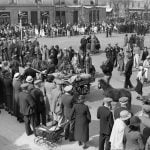William Lyon Mackenzie, one of the most famous figures in Canadian history, lived in Alyth for three years before he later emigrated. He was an only child, born in Dundee in 1795 to parents who originated in Glenshee. His father, a weaver, is thought to have died soon after his birth, and he was raised by his strongly Presbyterian mother, Elizabeth Chalmers. In 1814 they arrived in Alyth to open a general shop and subscription library in Toutie Street in a building that is now demolished. It stood at the far end of the current empty plot of ground on the left-hand side, adjoining Chapel Street, heading uphill.
William clearly entered into the life of Alyth and he knew the disabled mechanical genius James Sandy whom he later wrote about. William was well educated, an avid reader and adept at maths and book-keeping, but the shop failed and they decided to leave Alyth. Worse for some, William had fathered an illegitimate son, James, with an Alyth servant-girl named Isabel Reid. His mother took the child on, and in 1820 William emigrated to Upper Canada (Ontario), where he operated stores in Queenston (near Niagara) and Dundas (down the St. Lawrence), but he really wanted to be a newspaper owner and editor and in 1824 he founded the successful Colonial Advocateand moved to York (now Toronto).
Meanwhile his mother, son, and his intended wife, Isabel Baxter, arrived from Dundee. William was a radical and eager to be an active politician, advocating government responsible to the people of the colony and opposing the unrepresentative government oligarchy (the ‘Family Compact’) then in power in Upper Canada. His enemies disliked his democratic leanings, republican American sympathies and hostility to links between church and state.
Increasingly influential, William got himself into the Legislative Assembly (1829-34) and his fierce convictions got him expelled and re-elected several times. As the people’s hero, he became the first mayor of Toronto (1834). But, despite his complaints to London about the poor administration of Upper Canada, he failed to achieve the reforms he wanted and his frustration increased. In 1837, in a period of economic depression, insurrection broke out in Lower Canada (Quebec) and William took the opportunity to lead 1000 followers into armed rebellion in Upper Canada. It was easily defeated and two his fellow ringleaders were caught and hanged, and another died in prison.
William fled to the USA for the next ten years with a reward of £1,000 for his capture. In 1849, however, many of the government reforms he had fought for had been introduced and Queen Victoria granted him a pardon. He returned to Upper Canada and once again took up journalism and politics, becoming a member of the Legislative Assembly 1851-58. Admirers subscribed a considerable sum to buy him a house and he settled there, still strongly radical in his politics, until his death in 1861. Today, there are museums dedicated to his life and work in Toronto and Queenston, Ontario.
William’s youngest daughter, Isabel, had a son christened William Lyon Mackenzie King (1874-1950) who became an exceptionally clever lawyer. In 1921 he was elected Prime Minister of Canada for the Liberal party and remained so, on and off, for 21 years. He was prime minister throughout the Second World War and an associate of Churchill and Roosevelt. Always known as Mackenzie King, he proudly bore all three names of his grandfather.
Sources: Dictionary of Canadian Biography; Alyth Voice, April 2008, John M MacKenzie, ‘Toutie Street and Canada’


